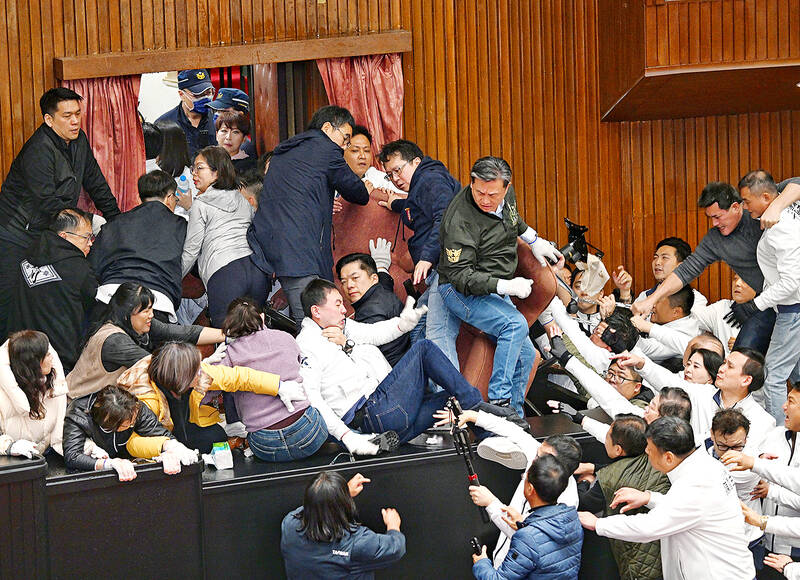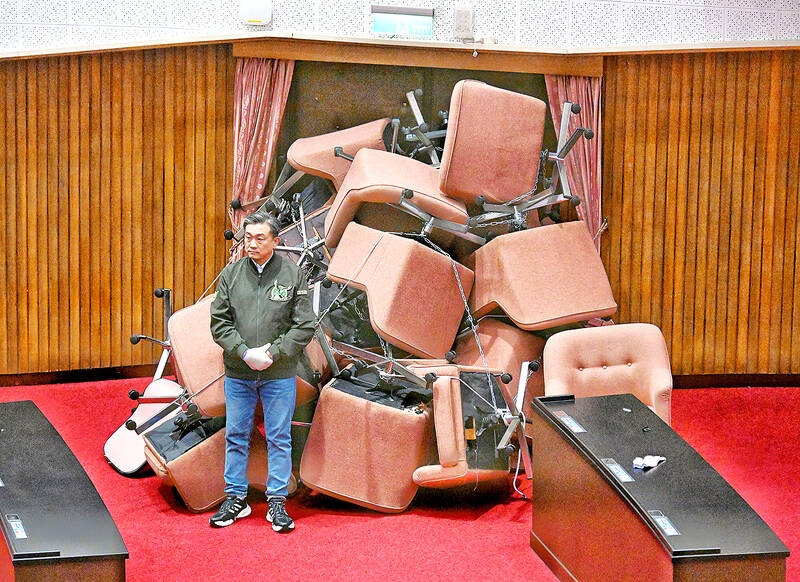This month Taiwan received a brutal Christmas present as the Chinese Nationalist Party (KMT) passed all three of its desired amendments, making recalls of elected officials more difficult, gutting the Constitutional Court and altering the budgetary allocations to local governments. The nation at present has no ultimate authority to determine the constitutionality of government actions, and the local governments, largely controlled by the KMT, have much greater funding. We are staring into an abyss of chaos.
The amendments to the Act Governing the Allocation of Government Revenues and Expenditures (財政收支劃分法), if they become law (as of this writing President William Lai (賴清德) has said he would promulgate them before the Jan. 2 deadline), would allocate 60 percent of available funding to local governments rather than the current 25 percent. According to the Directorate-General of Budgeting Accounting and Statistics (DGBAS) this would reduce central government spending by NT$375.3 billion (US$11.48 billion). The DGBAS also said the government would lose nine percent of its total revenue as a result of the amendments.
To put that figure in perspective, the defense budget for this year is currently set at NT$647 billion (US$20.24 billion), or 2.45 percent of GDP, while the budget as a whole is roughly US$90 billion. The resulting budget cuts would also reduce funding for health programs, such as cancer screening, that save government funds by catching problems earlier. Recall that the government has committed to massive investments in renewables over the next five years, and to social programs to support birth rates. Of course, government spending helps drive economic growth. These amendments are thus a vicious attack on the nation’s future.

Photo: Fang Pin-chao, Taipei Times
TAIWAN’S TAXES TOO LOW
The omitted variable in this debate is of course the nation’s pitiful tax take. According to an Organization for Economic Co-operation and Development (OECD) report this year, in 2022, the average tax-to-GDP ratio in 36 Asian and Pacific economies reviewed was 19.3 percent, below the OECD average of 21.5 percent. A CommonWealth Magazine piece from May of this year observed that Taiwan’s tax revenues as a percentage of GDP were just 19 percent, while its sales tax rate of five percent was the second lowest in the world, ahead of only tiny Andorra. It is telling that nobody in this debate has mentioned raising taxes — the refusal to tax Taiwan’s wildly undertaxed wealthy is the one value widely shared across the nation’s policymaking elites. This muted agreement is one reason the public has become so cynical about blue-green politics.
As I have noted before, land development and land speculation drive the domestic economy. These activities are the domain of Taiwan’s monied classes. In that ecosystem, low land taxes help drive high real estate asset prices. Academics Fu Chien-Hao (傅健豪) and Tseng Chung-Hsin (曾中信) analyzed Taiwan’s property tax system and found that it consistently undervalues real estate, a phenomenon that scales with property value: the gap between market value and assessed (tax) value is greatest for high value properties. The land tax is thus “severely regressive.” That is why the wealthy put their money into real estate.

Photo: Liao Chen-huei, Taipei Times
The same is true of other revenue systems. In another paper, Fu and Joseph Teyu Chou (周德宇) observe that the 2016 tax reform “helped reduce many tax-filing families’ tax liabilities, most tax benefits generated from the expansion of exemptions and deductions would likely be enjoyed by families with higher incomes.” The recent revisions to the land tax act have had similar effects.
The KMT’s amendments to the budgetary allocation represent the first time in 25 years that local governments have received more from the government budget than the central government. This is no coincidence. It suggests that what the pro-China parties seek is a return to the 1980s and 1990s, when local factions dominated local politics, and the government was for sale (nostalgia for authoritarianism of the Chiang Ching-kuo (蔣經國) era is little more than masked mourning for this period of local faction impunity). Those were the days when Chu An-hsiung (朱安雄) bought the Kaohsiung city council speaker election by bribing almost the entire city council — their confessions were elicited in exchange for the government foregoing indictments against them — and used his influence in Kaohsiung to get his wife a seat in the legislature and build his steel firm into the third-largest in Taiwan. Vote-buying and bribery were widespread.
LOCAL FACTION POWER GRAB

Photo: Fang Pin-chao, Taipei Times
How is this relevant? Many of us longtime Taiwan watchers think the KMT is slowly being hollowed out by powerful local factions. The authoritarian-era KMT did not permit local factions to operate at the regional or national level, fearing their competition, but it no longer has that kind of power. This shift of government budget funds to local governments help supercharge this trend as local politicians use the funds to feed and water their local patronage networks.
Local governments and the KMT-dominated legislature will likely look for ways to implement parts of the now-dead, cross-strait services pact, or perhaps explore former president Ma Ying-jeou’s (馬英九) insidious People’s Republic of China (PRC)-focused free enterprise zones. After all, there is no Constitutional Court to stop them.
Even as I write, the giant Matsu statue envisioned by former KMT Taichung mayor Jason Hu (胡志強) as a Mecca for Matsu worshippers and a gateway for PRC influence in Taiwan is under construction outside Taichung port.
It will also help ensconce and expand KMT power at the local level. It is obvious what will happen then: local legislators will vote for another round of weakening central government institutions. The PRC will then be able to gain influence in Taiwan via these governments. Naturally, a KMT-dominated legislature will make no changes to the current land tax system, which helps underpin its power at the local level and its influence among the wealthy. This will only create further links between the wealthy land holders and the PRC.
DEFENSE BUDGET
These budgetary changes are also aimed at another target: the US. US commentators frequently call for Taiwan to raise its defense budget to at least five percent of GDP. The corollary of this position is that if Taiwan does not raise its defense spending, the US will be justified in abandoning Taiwan.
Taiwan’s GDP last year was roughly NT$23.5 trillion (US$755 billion). Five percent of that is just under NT$1.2 trillion (US$36.6 billion). As DPP legislator Puma Shen (沈伯洋) observed in a livestream last week, the defense budget is the single largest item and the most easily adjusted portion of the government budget. It will likely take the largest hit.
The “abandon Taiwan” cacophony will now grow stronger. As intended.
Notes from Central Taiwan is a column written by long-term resident Michael Turton, who provides incisive commentary informed by three decades of living in and writing about his adoptive country. The views expressed here are his own.

We lay transfixed under our blankets as the silhouettes of manta rays temporarily eclipsed the moon above us, and flickers of shadow at our feet revealed smaller fish darting in and out of the shelter of the sunken ship. Unwilling to close our eyes against this magnificent spectacle, we continued to watch, oohing and aahing, until the darkness and the exhaustion of the day’s events finally caught up with us and we fell into a deep slumber. Falling asleep under 1.5 million gallons of seawater in relative comfort was undoubtedly the highlight of the weekend, but the rest of the tour

Youngdoung Tenzin is living history of modern Tibet. The Chinese government on Dec. 22 last year sanctioned him along with 19 other Canadians who were associated with the Canada Tibet Committee and the Uighur Rights Advocacy Project. A former political chair of the Canadian Tibetan Association of Ontario and community outreach manager for the Canada Tibet Committee, he is now a lecturer and researcher in Environmental Chemistry at the University of Toronto. “I was born into a nomadic Tibetan family in Tibet,” he says. “I came to India in 1999, when I was 11. I even met [His Holiness] the 14th the Dalai

Following the rollercoaster ride of 2025, next year is already shaping up to be dramatic. The ongoing constitutional crises and the nine-in-one local elections are already dominating the landscape. The constitutional crises are the ones to lose sleep over. Though much business is still being conducted, crucial items such as next year’s budget, civil servant pensions and the proposed eight-year NT$1.25 trillion (approx US$40 billion) special defense budget are still being contested. There are, however, two glimmers of hope. One is that the legally contested move by five of the eight grand justices on the Constitutional Court’s ad hoc move

Stepping off the busy through-road at Yongan Market Station, lights flashing, horns honking, I turn down a small side street and into the warm embrace of my favorite hole-in-the-wall gem, the Hoi An Banh Mi shop (越南會安麵包), red flags and yellow lanterns waving outside. “Little sister, we were wondering where you’ve been, we haven’t seen you in ages!” the owners call out with a smile. It’s been seven days. The restaurant is run by Huang Jin-chuan (黃錦泉), who is married to a local, and her little sister Eva, who helps out on weekends, having also moved to New Taipei